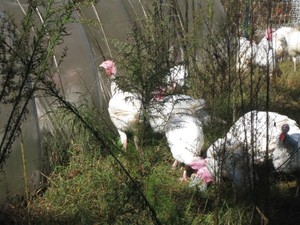
Blueberry Hill Farm
23 Sep Wed 2009
The Seasons of Eggs
The seasons are definitely changing. The hummingbirds left a couple of weeks ago, even though the weather has still been warm and humid. That's always a sure sign that summer is over. The grass out in the pastures looks tired and leaves are beginning to change. Is it just me or was it a short summer?
During the late spring and early summer I like to hop on the riding mower and mow around the pastures, not so much so the grass will be trim and neat, but mowing always scarfs up grasshoppers, crickets and leaf hoppers. Whenever I crank up that mower, a crowd of hens and Clancy always come running. They've learned that there's a feast to be had around the mower. I mowed some yesterday, but there just weren't many bugs out and about; another sign that summer is coming to a close. The hens were visibly disappointed.
Today I went on a feed run for all the critters and while at the feed store I decided to get 300 bait crickets to take back to the hens as a special treat. The crickets were secured in a paper bag. As I was going to be having lunch with some friends, I decided the bag needed a few holes punched into it so the crickets wouldn't "croak" while I was eating lunch. Arriving back at the farm with a "poke" full of dead crickets would have been very disappointing, indeed. I put the bag of crickets in the pocket of the door and away I went.
When I arrived at the restaurant and got out of the truck, I noticed about half a dozen crickets had escaped and were loose in the door pocket. Guess one of the holes was a little bit too big. I didn't think too much about the loose crickets and went on in to the restaurant. After about an hour or so I came back out to the truck to discover there were now about 100 crickets loose in the truck pocket. This was starting to look a little more serious. When I got out on the road, the combination of riding and air conditioning calmed those loose crickets right down and they were still and peaceful until we got down to the back hen house. Anyway, as I scooped crickets out of the door pocket and off the floor, the hens were like sharks in a feeding frenzy. They loved their treat and I was glad to share it with them.
I've know all along that there are changes that take place inside the eggs during different times of the year. It's just common sense that it should be so. The natural feed offerings of the late fall and winter are scarce. The grass goes dormant, weeds die back, insects hide and hibernate. Joel Salatin states it well in his book "Everything I Want To Do Is Illegal" (which is a must read for all those interested in the preservation of family farms and real food):
. . . I was showing my eggs to a chef once and he wanted to buy them right away. To be perfectly transparent, I warned him that in the winter they wouldn't be as deeply orange as they are in the green grass season. I didn't want to be accused of a bait and switch deal.
He immediately cut in, "Oh, that's no problem. In chef's school in Switzerland we had recipes for March eggs, recipes for June eggs, and other recipes for October eggs in order to accentuate the nuances of that particular season' eggs."
I stood there with my mouth agape. In the U.S., an egg is an egg is an egg. Can you imagine McDonald's offering a different menu item to accentuate the seasonal nuances of eggs? April Egg McMuffin, October Egg McMuffin. Along with the food, an attractive point-of-sale info-bulletin on earth-tone paper would explain the differences: "Note the whitish spikes of albumen around the edges, indicating a thicker albumen as we move into the winter." What a hoot!
So, for those of you who buy farm fresh, free-range eggs, expect the eggs to be a little different as we approach winter. Don't be quick to accuse the farmer of this or that, switching to inferior feed, or anything of the like. It's just part of the natural cycle of living things. Those eggs will still be better than any commerically produced egg you can buy in the supermarket and those free-ranging, "living-like-hens-ought-to-live" hens are enjoying their short lives on this earth because they're soaking up the sun, enjoying the fresh air, and scratching around in the dirt, even if buggy treasures are harder to find. They are running and flying and jumping and getting a full day's exercise and living out their "hen-ness" as nature intended and any confinement raised hen would give her comb and wattle to be living that same way, if only for a day!
